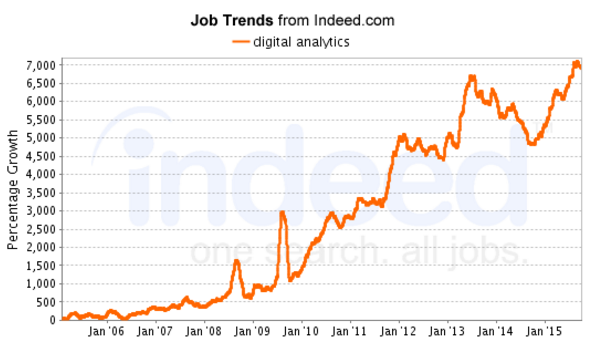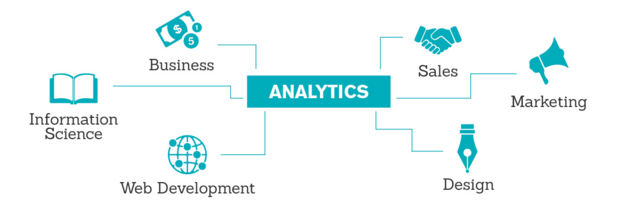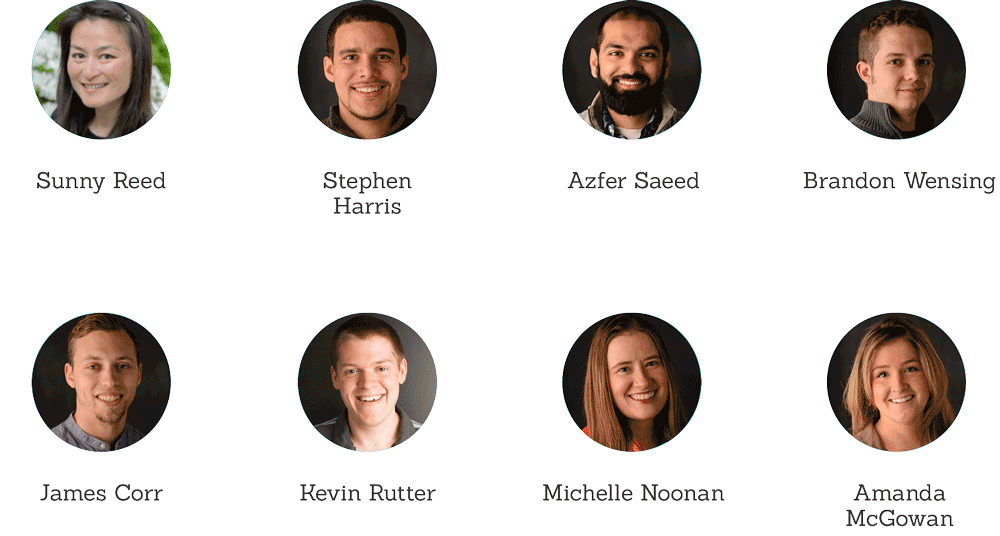7 out of 10 marketing execs are expected to increase their reliance on data analytics for decision-making over the next three years. (Source:eMarketer)
For marketing alone, digital analytics can pull valuable data on SEO, PPC, content, design, brand management, market research, development, & IT efforts to help drive strategy and effective campaigns.
With the big impact digital analytics can have on a business, companies need more employees than ever to fill this role. Over the last five years, the number of job postings for digital analytics jobs have skyrocketed. (Source: Indeed)

It’s clear that digital analytics is crucial to growing businesses, but as such a new profession - it can be a bit unclear exactly how one becomes involved in the field - and what exactly a digital analytics professional does.
We interviewed the digital analytics team at Seer to share their own experiences, varied backgrounds, and recommended tools to learn more about digital analytics and what a digitial analytics team, and role looks like.
The Best Analytics Teams Don’t Come from Analytics

Many think of a digital analytics role being filled by a data-junkie who pours over hundreds of numbers day after day. However, to drive key business decisions, a digital analytics professional must be more much more than number-saavy.
The goal of a digital analytics professional to “is to provide the right information at the right time so that business [leaders] can make better decisions with greater confidence. This goes far beyond basic reporting - it actually starts with a deep understanding of strategy (digital strategy or otherwise), the stakeholders involved, the decisions being made, goals and so on.” (Source: The Case for Closed Loop Reporting)
At Seer, our digital analytics team is composed of professionals from a variety of backgrounds; however, they all have one key trait in common - a drive to use data to unearth findings that will enable a business to answer crucial questions. Having a team composed of multiple backgrounds has enabled us to develop a stronger analytics process. As one member of the Seer team said to those interested in becoming a digital analytics professional, “Use your background to demonstrate a unique thought process. You have the opportunity to shape this industry, take it and run with it!”
Components of Digital Analytics
The roles in digital analytics are varied, non-exclusive, and provide opportunities for data-lovers to explore and grow in multiple areas. Digital analytics can be broken into various facets. The 5 main buckets consist of: reporting, analysis, business analyst, analytics set-up, & development.
At Seer, some team members are specialized in some of these roles, but others prefer to explore in each area. We've compiled resources to help you discover the different roles digital analytics professionals can have within a company.
- Reporting
- Analysis
- Business Analyst
- Analytics Set-Up/Adjustments
- Development
Now that you have a glimpse into the various digital analytics roles - what’s the background that someone needs to fill these positions successfully?
Analytics Tools and Resources
Critical thinking is the most important skill a digital analytics professional needs - however, technical skills are also crucial. Linked below are the main digital analytics tools you can use to learn about data management and how to analyze data.
Analytics tools
These tools allow digital analytics professionals to analyze large amounts of data easily and quickly:
Blogs
Blogs can be a terrific resource to do deep dives into specific analytics areas, see topics in action, and ask questions of the author:
Educational Sites
RegEx, R, and various other statistics platforms, can give you unique opportunities to analyze the data that you find:
Google+ Communities
And finally, don’t undervalue the opportunity to interact with others learning analytics like you through communities such as Google+:
Tips for Kick-starting your Analytics Career
As digital analytics is growing at an exponential pace, it can be hard to find mentors who are adapting and in the know of recent data trends. To help make the process a bit easier, digital analytics professionals at Seer share some of their top tips to stay motivated and succeed in the field.
Hands-On Experience - Experiment and Give it a Try!
Learning through doing can be an effective way to retain information. Hands-on experience will allow you to learn on the go and experience real world problems.
![]() “Nothing will teach you more than getting your hands dirty with a real world problem. Reach out to a non-profit and help them solve a problem.”
“Nothing will teach you more than getting your hands dirty with a real world problem. Reach out to a non-profit and help them solve a problem.”
“Setup a site and put tracking on it. Then you've got a sandbox you can play in! Fool around with the data, don't be afraid to setup more advanced tracking and see what happens. With an environment like this you can test your skills - give it a try!”
Continue to Learn - Grow Your Knowledge Base
An important aspect of analytics is continually learning as platforms and techniques change. This is a rapidly changing field, and staying on the top of new information is critical.

“Familiarize yourself with multiple Analytics platforms. Understand the commonalities, and the differences. Especially understand the shortcomings -- and the technical reasons why those shortcoming exist.
“Learn about Google Analytics and digital marketing. Teach yourself as much about Excel and RegEx that you can.”
Exposure to general marketing and web design/development can help to understand how your work can impact these two disciplines. Depending on which direction you want to go, classes in statistics, development, and marketing are all great.”
Networking - Consult the Experts
Forming relationships in the industry will allow you to ask questions, seek out opportunities, and as always, a proactive mindset can aid greatly.![]() “Find people within your network who are in the field - creating and nurturing relationships are critical. Next, do research online. Go through job listings to identify gaps between you and the job listing. Finally, put your pursuit in high gear and don't look back.”
“Find people within your network who are in the field - creating and nurturing relationships are critical. Next, do research online. Go through job listings to identify gaps between you and the job listing. Finally, put your pursuit in high gear and don't look back.”
Soft Skills - More Than Analytics
While you can have all the analytics knowledge, experience, and networking opportunities in the world, sometimes soft skills are absolutely critical, and in some situations, more important.
![]()
“Prove you're interested in learning, able to grow, able to adapt, and show passion.”
“Develop a curious and questioning mindset, and learn how to simplify your communication techniques.”
“Especially for those interested in analysis, presentation skills are key as well. Writing and public speaking classes/seminars can help you hone the skills needed to simplify and convey information.”
“Nurture ongoing curiosity as well as understand that there's much more than analysis that's involved with this field (strategy and implementation as well).”
Analytics is an ever-evolving process. Platforms, techniques, and processes evolve quick, but the core focus on actionable, impactful data never changes! The background and path can vary, the tools you can use to learn are numerous, but through the right analytics team, a business can unearth great strategies.
If digital analytics sounds like a career that you’d be interested in, feel free to check out Seer’s great analytics opportunities. Happy data digging!



